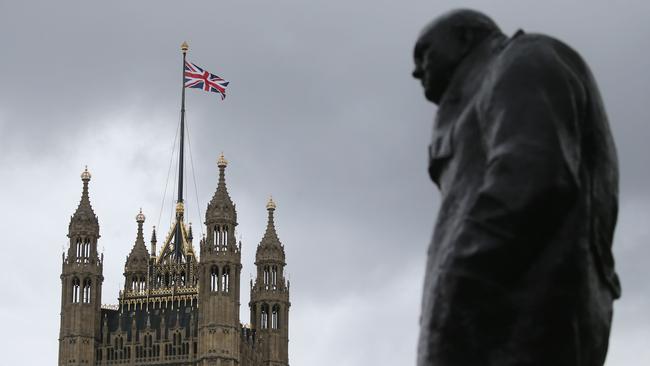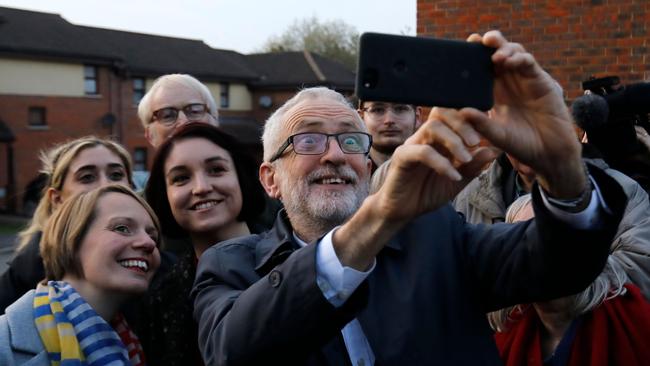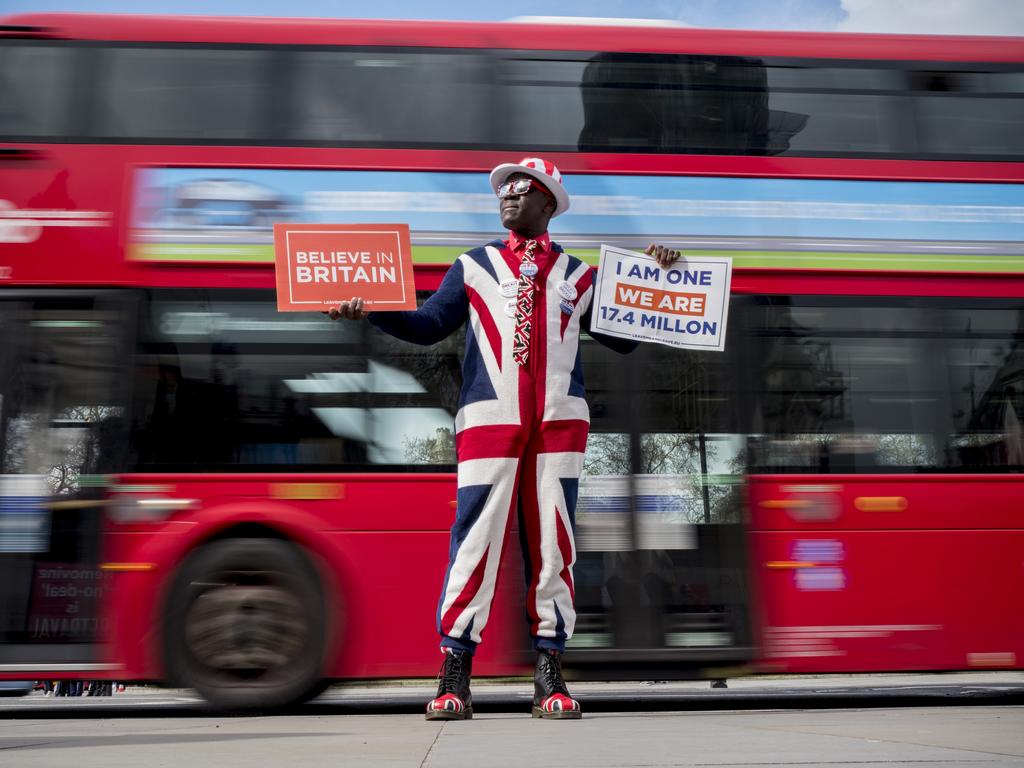British poll is truly an election for the ages, a hinge of history
Electing a Corbyn government would involve the most reckless lurch to madness in British history.

The British national election on December 12, pitting Boris Johnson against Jeremy Corbyn, is equally a hinge moment in history. Of course, the EU is not remotely Nazi Germany and no politician can be equated with Churchill. But this is the most important hinge since World War II, more so than Margaret Thatcher’s win in 1979. Though her achievements were epic, Britain was always going to turn away from Labour’s incompetent socialism.
The choices Britain faces today are more profound and fateful. This is a nation deeply divided, still split nearly 50-50 on whether it should leave the EU.
Modern Western politics, with every grievance amplified a thousand times by social media, subcultural myopia and ghetto-blaster echo chambers, is vitriolic everywhere. But British politicians are now routinely threatened, sometimes assaulted, in ways unimaginable even a decade ago. Politicians live with fireproof letter boxes, bulletproof windows, reinforced front doors, panic buttons. The vitriol comes from extremes of left and right.
A passionately pro-Remain friend in London tells me he nonetheless opposes a second referendum on leaving the EU as he fears violent social disorder.
This election also embodies far wider conflicts in British society and politics.
In June 2016, the British voted 52 per cent to 48 to leave the EU. In June 2017, a general election produced a minority Conservative government led by Theresa May.
For 3½ years, the wretched House of Commons has achieved nothing on Brexit. It could block everything, support nothing.
Now, under Johnson, a new withdrawal agreement has been reached with the EU. Johnson promises if the Conservatives win government they will quickly pass the legislation necessary for his withdrawal agreement and Britain will be out of the EU by January.
Get Brexit Done!, the Tories appealingly proclaim. The British electorate, while the majority for Leave or Remain flickers back and forth, is heartily sick of Brexit paralysis and wants it to end.
But whoever wins the election, Brexit won’t end. An element of May’s negative genius as Britain’s worst prime minister is that she wasted 3½ years working only on the withdrawal agreement. This was the EU’s insistence. Johnson has had to accept this sequencing too. What it means is that Johnson’s agreement only covers in any detail the transition period, which is set to run to the end of next year.
By that time, Britain and the EU are supposed to have negotiated their long-term relationship for the future. This is covered in the non-binding political declaration, which is better under Johnson than it was under May. It envisages a free-trade agreement between Britain and the EU.
Meanwhile, Britain observes almost all EU rules and regulations and cannot implement free-trade agreements with other countries until the transition period is over. That is why Donald Trump, in an unhelpful intervention, observed that Johnson’s agreement might prevent a deal between the US and Britain.
In all of its history, the EU has never finalised a free-trade agreement in one year. An EU free-trade deal has to be ratified by all 28 national EU parliaments and several regional parliaments as well. Assuming any such deal is eventually negotiated, if it can’t be ratified on time then there is provision for a further two-year extension to the end of 2022, during which Britain would still be observing EU rules, paying its divorce bill and having no say in EU deliberations. From Brussels’ point of view, this is perfect.
In truth, it’s hard to see the EU ever giving Britain a reasonable free-trade deal. It will want to prevent Britain getting any competitive advantage as a nearby economic powerhouse and, after Germany, the strongest European economy. It will insist on Britain remaining aligned to EU rules on environment and labour standards, perhaps on food standards, and even on some tax policy.
The Conservatives will be transformed by this election into a strongly pro-Brexit party. It’s hard to see them swallowing those restrictions in a post-EU Britain. Therefore, at some time next year, or two years after that, the whole agonising drama of a no-deal Brexit will come around again.
Of course, if Johnson has a strong majority, he may be able to get the EU to offer sensible terms, or he may be able to implement a no-deal Brexit.
Influential economics columnist and author Liam Halligan told me as soon as May invoked Article 50 and notice of formal withdrawal from the EU, she should have gone straight to negotiating a free-trade agreement and if that were not possible, as Halligan believed it wouldn’t be, then go for a clean Brexit, a no-deal option meaning Britain would trade under World Trade Organisation rules.
That was initially May’s strategy but she buckled almost instantly under EU pressure and negotiated according to the EU’s deadly timetable, agreeing to an exorbitant divorce bill — £39bn — and the painstaking negotiation of a withdrawal agreement, with talks on the substance of the future relationship to begin only after that was ratified by both sides.
Johnson’s strategy in this election will be not to talk much about what happens at the end of the transition period. He can reasonably argue that he is taking the EU at face value and not countenance the prospects that free-trade agreement talks might fail. And if they do fail, he can rightly blame Brussels.
The polls vary, but at the moment put Johnson’s Tories anywhere from eight to 14 points ahead of Labour. Most analysts think if the Conservatives lead Labour by more than 10 per cent, they get a majority. But there is a substantial anti-Tory gerrymander still in the British system, not least through the overrepresentation of Scotland in the House of Commons.
Analysts also think the Tories might lose some seats in Scotland, and some London seats that voted Remain in the referendum, as well as some in the west of England where the Liberal Democrats were traditionally strong. Those forecasts might prove wrong if there is a Tory wave.
May failed to pick up pro-Remain voting, socially conservative, patriotic, working-class, Labor seats in the Midlands and the north and in Wales. Wales, like England, voted to Leave the EU. Voters in all those seats considered voting Conservative in the last election but for many reasons were not attracted to May, who turned out to be one of the worst campaigners in modern politics.
At first blush it might look unlikely that the Eton and Oxford toff Johnson could snare the so-called Workington man, named after the pro-Leave, working-class, rugby league town in Cumbria. Workington man is white, male, working-class, likes his rugby league and is middle-aged and not overly burdened with postgraduate qualifications.
If Johnson does win, the rugby theme deserves wider investigation. Johnson nearly got an all-Brexit Rugby World Cup final — with England and Wales — the two British nations that voted to leave both in the semi-finals, unlike Remain-voting Scotland and Ireland, who were eliminated at earlier stages. The rugby union-playing Johnson now needs his rugby league cousins in northern England to come to the party.
To think that Johnson cannot relate to people like that is to make the same mistake the commentariat made about Trump, in thinking that a thrice-married, Manhattan property billionaire would be an unrelatable figure for midwest, white, working-class voters, especially male voters. Not only did Trump win them from the Democrats, he got many of them to vote for the first time.
Similarly, Johnson led the Brexit referendum campaign, which had a margin of victory entirely made up of people, many of them Workington-man types, who don’t normally bother to vote.
Johnson is offering finality on Brexit, reassertion of British sovereignty and control over social regulation, money, immigration, as well as a tough law-and-order campaign. But he is also offering huge social welfare spending on the National Health Service, schools and police, and is otherwise socially liberal with an extremely racially diverse cabinet. He is generally pro-immigration — and a great admirer of Australian immigration — but wants Britain to control who comes into its country.
It is silly to describe that as hard-right. It is reasonable to call it populist, though populist surely can no longer be a term of abuse.
Johnson is a big personality who has not lost an election in 20 years. He represents patriotism, sovereignty and decisiveness. But he can only implement his vision for Britain if he wins a clear majority. His only natural coalition partner, the Democratic Unionists of Ulster, with their 10 MPs, reject his withdrawal agreement because it divides Northern Ireland from the rest of Britain.
And if Johnson wins very narrowly, then he will probably get his withdrawal agreement over the line, but when the no-deal moment of truth rolls around next year, there could still be enough Remainers within Tory parliamentary ranks to make it impossible for Johnson to follow through.
Corbyn, on the other hand, rightly says he is offering Britain the most radical manifesto it has ever seen. It is impossible to overstate the extremism of Corbyn and the claque of barely ex-communists around him. Despite coming across as an avuncular version of Albert Steptoe, Corbyn has spent his life associating with terrorists, befriending Hamas and the IRA at its most vicious, giving shelter and support to anti-Semites, praising the economic model of Venezuela. He is almost a Monty Pythonesque caricature of a sectarian far-left obsessive. But Labour’s machine is formidable on the ground.
Corbyn is pledging to institute a four-day working week, to nationalise 10 per cent of all big companies and redistribute this to workers, to renationalise water, energy and transport at prices to be determined by parliament, to raise taxes all round, to abolish private schools. On its first day, his government will buy enough property to house all the homeless.
He has a million other popular commitments which would, taken together, be unaffordable and involve massive government borrowing — higher pay for civil servants, more public holidays, wiping out all student debt.
Labour also wants to abolish immigration controls and allow all EU citizens in Britain to vote in British elections, as well as 16- and 17-year-olds.
Corbyn is a lifelong enemy of NATO and Britain’s independent nuclear deterrent but says for the moment he would keep both. He hates Trump and mostly hates America.
It is true that Corbyn in government could not possibly be as bad as he promises to be. And he would be constrained by the numbers in parliament and by British institutions. But electing a Corbyn government would involve the most radical, reckless and damaging lurch to madness in British history.

It’s unlikely Corbyn will win government in his own right, though not absolutely impossible. But if the Scottish Nationalists and the Liberal Democrats both make big gains at the expense of the Tories, he could head a minority government. In exchange for SNP support, he would agree to a new referendum on Scottish independence.
His position on the EU is that he would negotiate a new deal, almost certainly a surrender Brexit involving Brexit in name only, and then take that to a referendum with the Corbyn deal or remaining in the EU altogether as the only options.
If Britain finally stays in the EU it will be the single greatest defeat for British sovereignty, and for British democracy, in that nation’s modern history. Britain will be humiliated and the very idea of Britain will be humiliated.
Whoever loses this election, Corbyn or Johnson, will not only be personally discredited. The ideas they are most closely associated with — moderate nationalism for Johnson and unreconstructed Marxism for Corbyn — will be discredited.
Some analysts believe the break-up of the United Kingdom, with Scotland becoming independent and Northern Ireland joining the Republic of Ireland, is now more likely. I am sceptical of this. Corbyn will give the Scots an independence referendum (though ironically he could not govern without Scottish MPs). The SNP wants a referendum while Britain is part of the EU, in the hope it could stay in the EU.
Johnson would not authorise a new independence vote for years, if ever. Scotland gets huge fiscal subsidy from England. To join the EU it would need to adopt the euro and savagely tame its budget deficit. It would embrace a Greek future.
It shows the folly of Tony Blair’s devolution, which has regional governments without budget responsibility and leaves England as the only British nation without a regional parliament. Scottish MPs vote on laws in England but English MPs only pay money to Scotland.
In Northern Ireland, a transient opinion poll in favour of reunification with the republic is meaningless. The existential purpose of Northern Ireland unionism is to be part of the United Kingdom. And British public services are better funded than Republic of Ireland services.
This is truly an election for the ages, a hinge of history. The stakes are huge, not only for Britain. No recent election, outside Trump in 2016, has meant more to the West.





When the Conservative Party chose Winston Churchill to be its leader in 1940 it changed the course of British history, and Western civilisation. It was, as historians say, a “hinge” moment in history. The British were not so much choosing a prime minister as a destiny. In preferring Churchill to pro-appeasement Lord Halifax, the British chose defiance, fight, sovereignty, no deal.